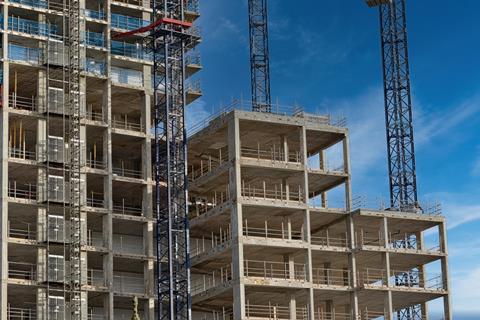Chief Philip White says regulatorās attempts to engage developers rather than turn applications down have contributed to delays
The ŠŌ°ÉµēĢØ Safety Regulator (BSR) is looking at taking a āfirmer approachā by rejecting more gateway 2 applications outright as it seeks to decrease delays in building control approval, the organisationās chief has said.
Since taking over the building control for higher-risk buildings, the regulator has been subject to a stream of criticism from the housing development sector over delays of up to 11 months to approval at the āgateway 2ā pre-construction stage.

In a statement published on the governmentās website, Philip White, chief inspector of buildings at BSR, he stressed that āindustry needs to step up and comply with the processā in providing good quality applications.
White indicated that the regulator could begin taking a different approach in how it handles poor quality applications in order to ensure more complete submissions are not delayed.
He said that the regulatorās attempts to engage with applicants rather than simply rejecting submissions had meant that applications ātake longer and appear to be delayedā.
āOf course, the time we spend on those incomplete applications is time we canāt spend on others, some of which would be perfectly good to go,ā he said.
He said a shift in method could mean the regulator takes a āfirmer approach to rejecting those applications that arenāt making the bar straight awayā.
He explained that a backlog of cases which built up last summer was āalmost clearedā, but the regulator was still struggling with poor quality applications.
White explained that application volumes had been āsteadyā when it first took on building control for higher-risk buildings, but that things changed in Spring 2024 when transitional arrangements from the pre-ŠŌ°ÉµēĢØ Safety Act regime came to an end and private building control suffered a collapse.
He said the ātemporary backlog of casesā that subsequently built up before July 2024 had nearly been dealt with by the regulator.
While White said there were āa small set of applications from the pre-July backlog that have been in the system for a long timeā, approval times had otherwise come down. He said that for other applications, the average Gateway 2 handling time was now around 16 to 18 weeks.
However, he stressed that āindustry needs to step up and comply with the processā in providing good quality applications.
The most recent data showed 44% of applications were still being rejected at the validation stage, which is a simple administration check that all the required documents have been supplied.
He emphasised that the process was not āred tape for the sake of itā, but that it was āpreventing risks and problems from being designed into the built environmentā.
āItās about making sure residents have safe and quality homes and avoiding costly works at a later date. Or homeowners not being able to secure lending and insurance,ā he said.
>> Read more: What the delays at the ŠŌ°ÉµēĢØ Safety Regulator mean for high-rise development
He also outlined some of the most common and serious failures in applications. These included missing details on how key structural components connect, inadequate information on fire resistance of cladding, walls or barriers, corridors that donāt meet evacuation width requirements and poorly designed or unproven smoke extraction systems.
āThese arenāt minor omissions ā they present significant safety risks and lead to delays in the approval process,ā he said.























No comments yet